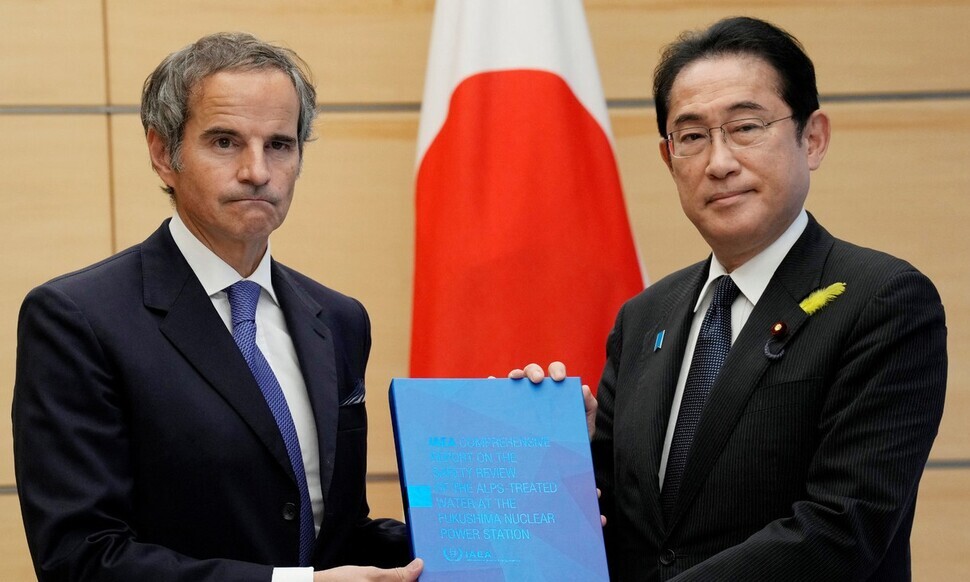hankyoreh
Links to other country sites 다른 나라 사이트 링크
8 in 10 Japanese people find explanation for Fukushima water dumping “inadequate”

As the Tokyo Electric Power Company (TEPCO) plans to move ahead with releasing contaminated water currently stored at the Fukushima Daiichi nuclear power plant into the ocean next month, a new poll finds that over 80% of Japanese people consider their government’s explanation of the process “inadequate.” That view seems to be shaped by opposition from the fishers who will be directly impacted by the planned discharge of water.
Kyodo News reported that 80.3% of 1,034 local respondents polled on the phone on July 14-16 felt the government’s explanation of the planned discharge has been “inadequate.” Just 16.1% of respondents found it “adequate.” Another 87.4% of respondents said they thought releasing the contaminated water would cause financial damage because of the associated stigma.
Other polls have found that more Japanese people support releasing the water than oppose it. A telephone poll of 939 people carried out by the Japanese newspaper the Asahi Shimbun on July 15-16 found 51% of respondents in favor of dumping the water and just 40% against it.
A major reason for dissatisfaction with the Japanese government’s “inadequate explanation” is opposition from Japan’s fishing industry. Fishers have held firmly to their opposition despite the government’s repeated attempts to convince them of the safety of the contaminated water.
Economy Minister Yasutoshi Nishimura visited Japan’s National Federation of Fisheries Cooperatives, the industry’s biggest lobby group, on July 14 and pledged to provide sweeping remedies for reputational damage. But the federation chairperson, Masanobu Sakamoto, only reiterated the industry’s opposition to the release.
In August 2015, TEPCO pledged in a document signed by the company president himself not to do anything without the blessing of “related individuals” — namely, the fishing community. That’s one of the reasons that community’s consent is so important for the Japanese government as it seeks to justify its decision to release the contaminated water.
Prime Minister Fumio Kishida’s approval rating has been sagging as the contaminated water discharge issue collides with the chaotic rollout of Japan’s “My Number” ID card, which provides access to health and pension services.
While the Kishida Cabinet’s approval rating rose above 50% after the G7 summit in Hiroshima in May, it has dropped below 40% this month. Kishida’s support stood at 34.3% (down 6.5 points from the previous month) in a Kyodo News poll and at 37% (down 5 points) in an Asahi Shimbun poll.
By Kim So-youn, Tokyo correspondent
Please direct questions or comments to [english@hani.co.kr]

Editorial・opinion
![[Column] The miscalculations that started the Korean War mustn’t be repeated [Column] The miscalculations that started the Korean War mustn’t be repeated](https://flexible.img.hani.co.kr/flexible/normal/500/300/imgdb/original/2024/0630/9717197068967684.jpg) [Column] The miscalculations that started the Korean War mustn’t be repeated
[Column] The miscalculations that started the Korean War mustn’t be repeated![[Correspondent’s column] China-Europe relations tested once more by EV war [Correspondent’s column] China-Europe relations tested once more by EV war](https://flexible.img.hani.co.kr/flexible/normal/500/300/imgdb/original/2024/0628/7617195640940814.jpg) [Correspondent’s column] China-Europe relations tested once more by EV war
[Correspondent’s column] China-Europe relations tested once more by EV war- [Correspondent’s column] Who really created the new ‘axis of evil’?
- [Editorial] Exploiting foreign domestic workers won’t solve Korea’s birth rate problem
- [Column] Kim and Putin’s new world order
- [Editorial] Workplace hazards can be prevented — why weren’t they this time?
- [Editorial] Seoul failed to use diplomacy with Moscow — now it’s resorting to threats
- [Column] Balloons, drones, wiretapping… Yongsan’s got it all!
- [Editorial] It’s time for us all to rethink our approach to North Korea
- [Column] Why empty gestures matter more than ever
Most viewed articles
- 1[Column] The miscalculations that started the Korean War mustn’t be repeated
- 2Dreams of a better life brought them to Korea — then a tragic fire tore them apart
- 3S. Korea joins US, Japan for first multi-domain drills at a time of escalating tensions
- 4Yoon echoed conspiracy theories about Itaewon disaster, former National Assembly speaker says
- 5Moscow tells Seoul to rethink ‘confrontational course’
- 6[Editorial] It’s time for us all to rethink our approach to North Korea
- 7[Column] Balloons, drones, wiretapping… Yongsan’s got it all!
- 8CIA record confirms US ‘completely destroyed’ Seoul’s Haebangchon in 1950 bombardment
- 9[Correspondent’s column] Who really created the new ‘axis of evil’?
- 10[Editorial] Exploiting foreign domestic workers won’t solve Korea’s birth rate problem